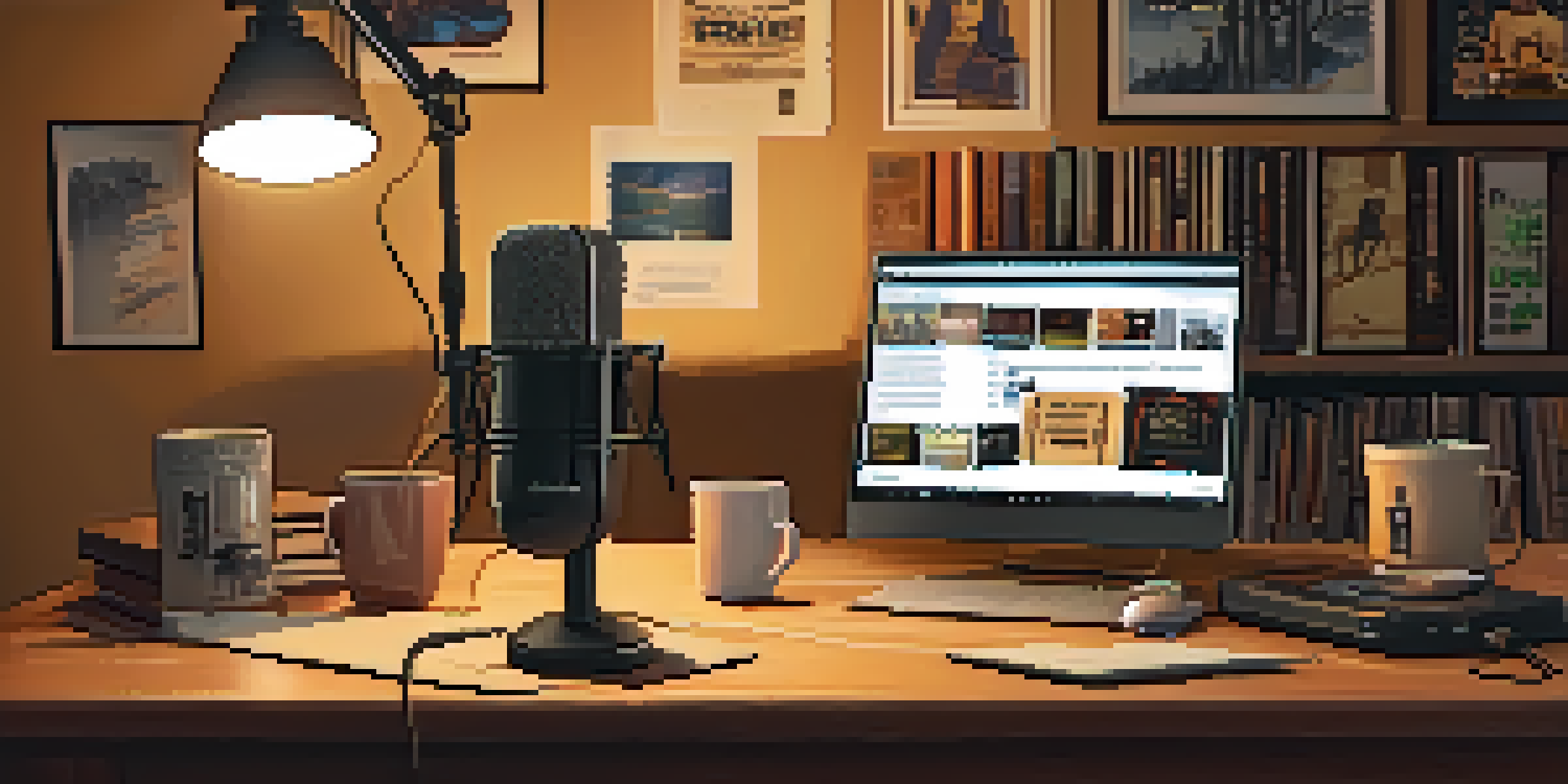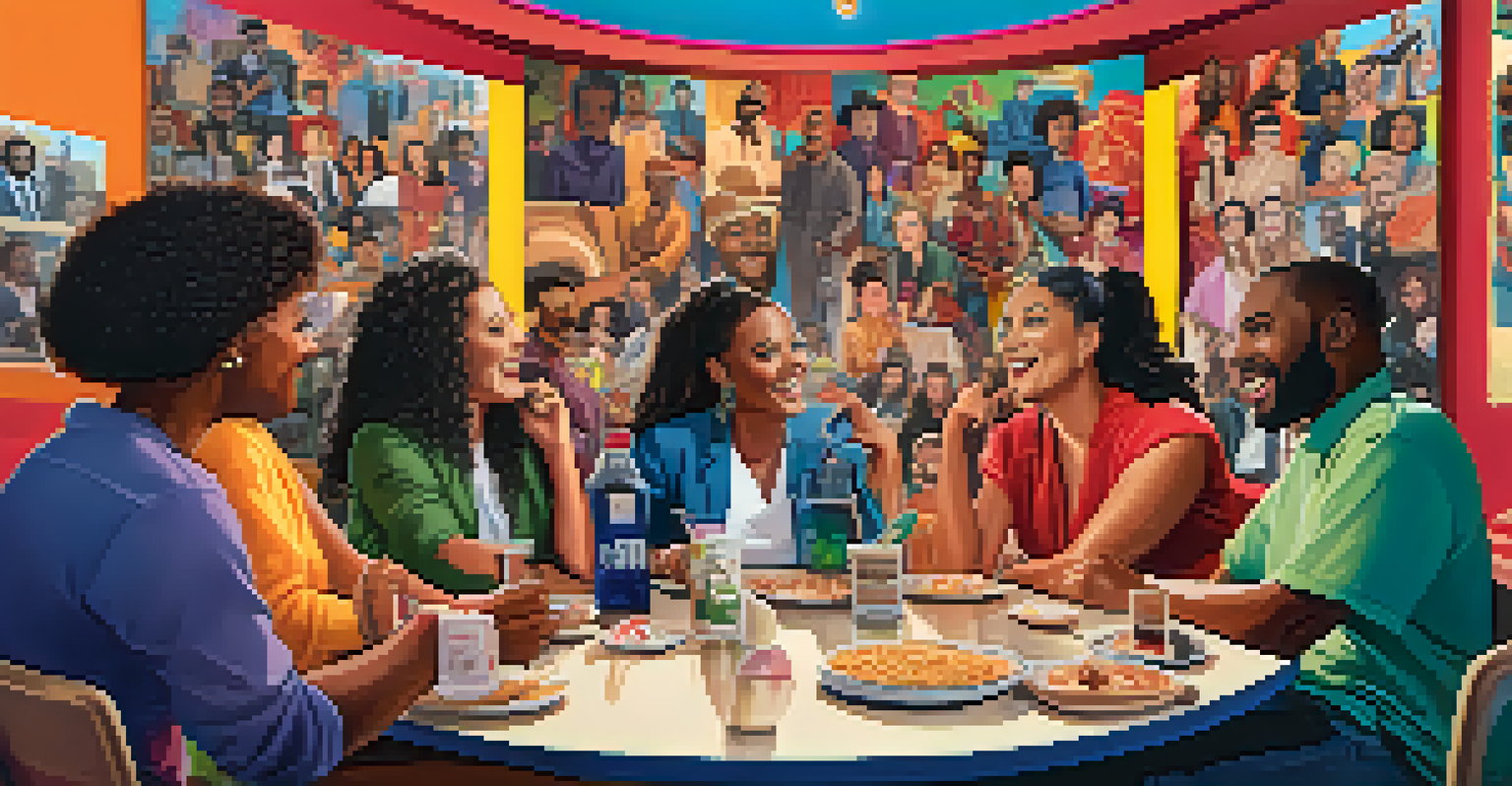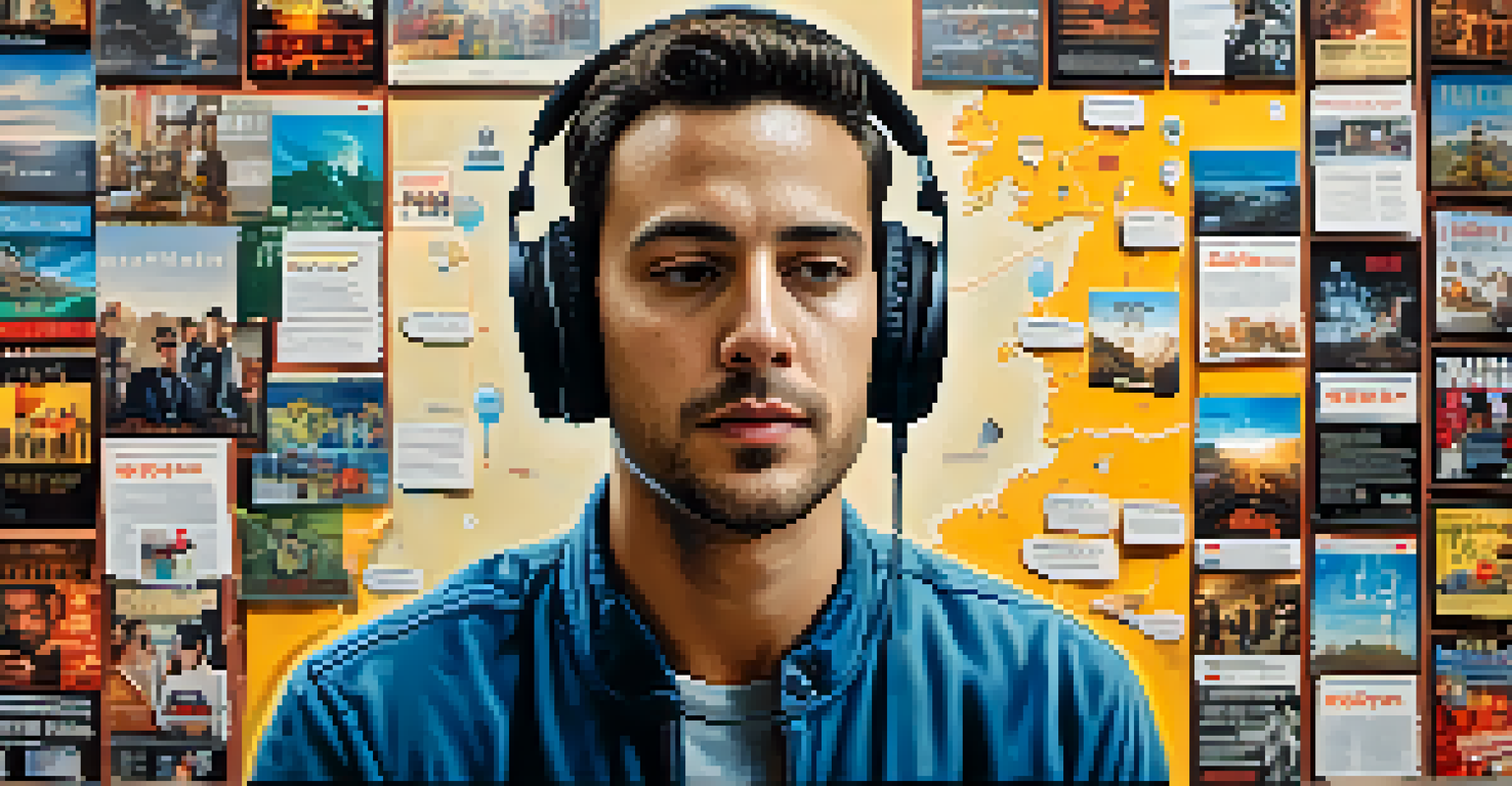Podcasts as a New Medium for Film Criticism and Discussion

The Rise of Podcasts in Film Criticism
In recent years, podcasts have surged in popularity, becoming a go-to medium for many film enthusiasts. This shift is largely due to their accessibility; anyone with a smartphone can tune in while commuting, exercising, or relaxing at home. Unlike traditional media, podcasts offer a conversational style that invites listeners to feel like part of the discussion.
Podcasts are a platform for sharing diverse voices and perspectives that often go unheard in traditional media.
Film criticism has often been confined to print publications or televised reviews, but the podcast format allows for deeper exploration of themes, characters, and cinematic techniques. For instance, shows like 'Filmspotting' and 'The Next Picture Show' encourage listeners to engage with films in a way that feels both informative and entertaining. This new approach breaks down barriers, making film analysis more approachable to a wider audience.
Moreover, the intimate nature of podcasts creates a unique bond between hosts and listeners. This personal connection can lead to a more engaged audience, as listeners often feel they are part of a community sharing a common passion for cinema.
Diverse Voices in Film Discussion
Podcasts have opened the door to a diverse range of voices in film criticism, allowing underrepresented perspectives to shine. Unlike traditional media, where the same critics often dominate, the podcasting landscape is filled with creators from various backgrounds, experiences, and tastes. This diversity enriches the conversation around films, offering fresh takes that resonate with different audiences.

For example, podcasts like 'Black Girl Nerds' and 'The Reel Deal' provide platforms for women and minorities to share their insights on film, highlighting narratives that mainstream criticism might overlook. By amplifying these voices, the film discussion becomes richer and more inclusive, reflecting a broader spectrum of experiences.
Podcasts Make Film Criticism Accessible
The rise of podcasts has transformed film criticism into a more accessible and conversational format, inviting listeners to engage deeply with cinematic discussions.
Additionally, this diversity not only benefits listeners but also encourages filmmakers to consider different viewpoints when creating content. As audiences demand more representation, the conversation surrounding film continues to evolve, making it a dynamic and exciting field.
Interactive Engagement with Audiences
One of the standout features of podcasts is the ability to engage directly with audiences. Many podcasts encourage listener participation through social media, email, or even live Q&A sessions. This interactive element allows fans to share their thoughts on films, ask questions, and even suggest topics for future episodes.
The beauty of podcasts lies in their ability to create a dialogue, where listeners feel they are part of the conversation.
This two-way communication fosters a sense of community among listeners, making them feel valued and heard. For instance, some podcasts dedicate episodes to listener feedback or film choices, showcasing the power of audience interaction. This engagement not only enhances the listening experience but also creates a loyal fan base.
Moreover, the immediacy of podcasts means that hosts can react to films shortly after their release, creating timely discussions that resonate with current events. This responsiveness keeps the content relevant and allows for a vibrant dialogue around new cinematic releases.
Long-Form Discussions on Cinema
Podcasts excel at providing long-form discussions that delve deep into film analysis. Unlike traditional reviews that may only scratch the surface, podcasts can take the time to explore complex themes, character arcs, and filmmaking techniques in a detailed manner. This depth of discussion invites listeners to think critically about what they watch.
For example, a podcast episode might spend an hour dissecting a single film, breaking down scenes, discussing the director's choices, and even comparing it to similar works. This kind of thorough analysis can enrich a viewer's appreciation for a film and inspire them to think more deeply about their own viewing experiences.
Diverse Voices Enhance Film Dialogue
Podcasts offer a platform for underrepresented voices in film criticism, enriching discussions with fresh perspectives that reflect a wider array of experiences.
Additionally, the long-form format allows hosts to invite guests, such as filmmakers, actors, or scholars, who can provide unique insights and expertise. These conversations often lead to surprising revelations and a deeper understanding of the art of cinema.
The Role of Humor in Film Criticism
Humor plays a vital role in podcasts, making film criticism more enjoyable and relatable. Many hosts incorporate wit and lighthearted banter into their discussions, allowing listeners to engage with content in a fun way. This approach can ease the tension often associated with serious film critique.
For instance, podcasts like 'How Did This Get Made?' humorously dissect bad movies, turning what might be a painful viewing experience into an entertaining discussion. This blend of comedy and critique not only entertains but also invites listeners to share their own experiences with less-than-stellar films.
Humor can also serve as a bridge to more profound insights, making complex themes easier to digest. By using jokes and lighthearted commentary, hosts can discuss serious topics, such as representation and societal issues in film, without alienating their audience.
Access to Global Cinema Through Podcasts
Podcasts provide an opportunity to explore global cinema, introducing listeners to films they may not have otherwise encountered. Many shows focus on international films, offering insights into different cultures, storytelling styles, and cinematic traditions. This exposure broadens the horizons of film enthusiasts and nurtures a more global perspective.
For example, podcasts like 'The Projection Booth' delve into foreign films and niche genres, often highlighting hidden gems that deserve more attention. By discussing these films, hosts can educate their audience about diverse voices and narratives in cinema, enriching the overall film experience.
Interactive Engagement Builds Community
The interactive nature of podcasts fosters a sense of community among listeners, encouraging them to participate in discussions and share their insights on films.
Additionally, this access to global cinema fosters a greater appreciation for the art form, as listeners become aware of the myriad ways stories can be told. This understanding can influence their viewing choices and encourage them to seek out international films.
The Future of Film Criticism in Podcasting
As the podcasting medium continues to grow, the future of film criticism looks bright. With more creators entering the space, we can expect a wider variety of voices and perspectives that challenge traditional norms. This evolution will likely lead to even more innovative and engaging discussions about cinema.
Moreover, as technology advances, podcasts may incorporate new formats and interactive features, such as augmented reality or live-streamed discussions. These developments could enhance the way audiences engage with film criticism, making it an even more immersive experience.

Ultimately, podcasts are shaping the future of film criticism by democratizing the conversation around cinema. With their unique blend of accessibility, diversity, and engagement, they are paving the way for a more inclusive and dynamic dialogue about the films we love.